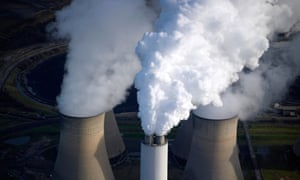Kickstarting the carbon capture and storage industry with a state-backed company will deliver the clean electricity needed to meet climate targets more cheaply than Hinkley Point C, says government advisory group

The UK must immediately kickstart an industry to capture and bury carbon emissions in order to save consumers billions a year from the cost of meeting climate change targets, according to a high-level advisory group appointed by ministers.
This requires the setting up of a new state-backed company to create the network needed to pipe the emissions into exhausted oil and gas fields under the North Sea, the group said.
With this government backing, carbon capture and storage (CCS) could deliver clean electricity at a lower cost than an expanded Hinkley Point nuclear power station and almost all renewables, the group’s report states.
A CCS industry could also provide thousands of jobs, particularly in industrial heartlands such as Teesside and Grangemouth, and help reverse the fortunes of the declining North Sea fossil fuel industry. It could even tackle the major problem of cutting emissions from gas boilers, by enabling clean-burning hydrogen to be pumped into the grid.
Failing to deliver CCS would hugely increase the cost of tackling climate change, according to the government’s official climate advisors, the National Audit Office and the UN’s climate science panel.
But in November the government made a shock decision to cancel a £1bn CCS development competition at the last minute, citing high costs. The new report, commissioned in the aftermath by then energy secretary Amber Rudd, says using a state-backed company would slash the price.
“Money spent now will save money later,” said Lord Ron Oxburgh, an independent member of the House of Lords and former chairman of Shell Transport and Trading, who led the report. “CCS is a priority for Britain if our 2050 climate goals are to be achieved at least expense. Government intervention and leadership is crucial and, in common with major projects such as the delivery of the London Olympics, the role of the public sector will be crucial in the early years.”
“There were a number of people in our group that were sceptical that this really was the least-cost way forward, but even our hard-nosed bankers and businessmen agreed,” he said.
Lord Oxburgh said, despite the technology being ready, no commercial company could justify investing in the CCS pipe network by itself: “There is no serious commercial incentive and it will stay that way unless the state demonstrates there is a business there.”
Prof Stuart Haszeldine, a CCS expert at Edinburgh University and a member of the advisory group, said another crucial immediate action is to take into temporary public ownership the offshore pipelines to the gas fields of Atlantic, Goldeneye and Hamilton, which are imminently due to be decommissioned but would be ideal for transporting CO2 to storage sites.
The report will be presented to Rudd’s successor, Greg Clark, who is secretary of state at the new Department of Business, Energy and Industrial Strategy (BEIS). A spokeswoman for BEIS said the recommendations of the report would be carefully considered, but that the costs of CCS had to be competitive if it was to play a part in the long-term decarbonisation of the UK’s economy.
“We will need a range of technologies as we create a clean energy future but above all we must ensure they are affordable,” she said.
The report argues this can be achieved for CCS if the government immediately sets up a state-backed company which would then build gas-fired power stations with CCS technology and develop the network to transport and bury the CO2.
With the pipes in place, the company would then be able to take and store CO2 from other power and industrial plants, charging for the service. Income would come from the levies on consumer energy bills that currently support low carbon electricity such as renewables and nuclear power. The report says support of £85/MWh would be sufficient, cheaper than all renewables bar onshore wind – now virtually halted by the government – and Hinkley Point C.
The company would need £200-£300m of government seed funding, the report says, with private investors providing the rest. Once established, the power plants could be privatised and the transport and storage enterprise run as a regulated utility with prices capped, like a water company.
“It is not government subsidy, this is government investment, and with any luck the government will get its money back and better as time goes on,” said Lord Oxburgh. CCS could capture 40% of the UK’s emissions by 2050, according to the report, saving up to £5bn a year compared to alternative strategies.
CCS could also potentially enable hydrogen to solve the problem of cutting the emissions from the nation’s gas boilers and stoves, currently 25% of all emissions and a major factor in the UK’s imminent failure to meet clean energy targets.
Natural gas can be converted to hydrogen and the CO2 produced buried using CCS. The hydrogen, which produces only water when burned, could then replace the gas in the national grid. This could also provide fuel for hydrogen-powered cars, as well as cutting the significant air pollution caused by gas boilers.
Lord Oxburgh said he only partly blamed the big fossil fuel companies for not developing CCS themselves, in order to protect their businesses from climate change laws: “Ultimately you have to answer to your shareholders. As far as they are concerned, if you have a company that is doing alright and making money, why waste time and money doing something that may or may not pay off?
“It really has to do with how convinced people were that the government was serious about climate change. Once the government really shows its commitment, CCS will take off.”

